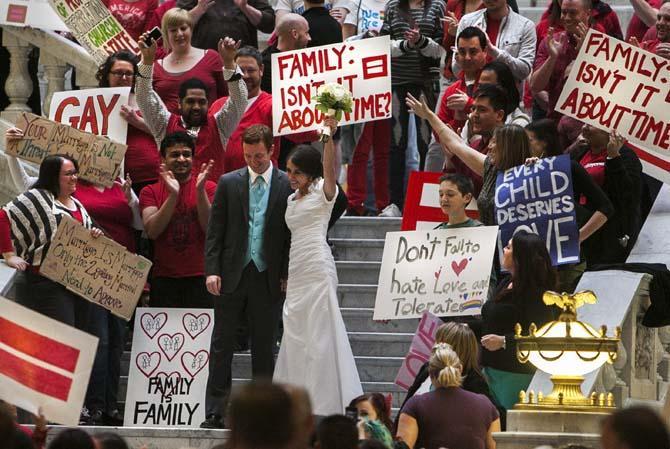The U.S. is a country founded on the ideals of liberty and justice for all, but the historical reality is strikingly different.
Today, citizens in our country enjoy more personal rights and liberties than almost any other moment in history. As the oldest democratic government, the U.S. has often been viewed as a beacon of individual freedoms and progress, but these ideals have only recently been realized.
Our country’s founding fathers and framers created a system of government to protect the rights and individual freedoms of white land-owning men; it was not meant to protect all people. This demographic was the most powerful and influential so the founders created a system that benefited them the most, even at the expense of others.
In 1791, the framers made sure to enshrine the rights of this narrow group into the founding documents, everyone else has had to play catch up ever since.
Freedom was not a legally guaranteed right until December 1865. Non-land-owning white men were not allowed to vote until 1868. Black men were then allowed to vote in 1870. Women were finally allowed to vote in 1920, and Native Americans were not able to vote until 1924.
Rights extend far beyond voting. While opposite-sex marriage has always been an institution, same-sex marriage was only recognized as a right in 2015. The right to privacy that protects a woman’s choice to have an abortion only came about in 1973. It took until 1990 for Americans with disabilities to have their rights protected. Disadvantaged populations have always had to fight for their personal protection.
The framers presented ideals of equality and liberty but only a fraction of the American people had access to these freedoms. Despite the limited scope for whom the documents originally protected, the language and wording of the founding documents were meant to be flexible and adaptive.
James Madison knew that times would change and more rights would need to be added, so he made sure to include the Ninth Amendment, “The enumeration in the Constitution, of certain rights, shall not be construed to deny or disparage others retained by the people.”
The current interpretation of the bill of rights is far more modern than people realize. The definition of free speech in the 1800s was far more limited and oppressive than any modern concept we have of free speech. The current state of gun ownership and the idea of a deep-seated right to personal weapons for self-defense was only made constitutional precedent in 2008 in the case of District of Colombia v. Heller. The concept of liberty and justice for all has only recently held truth and even then there is work to be done.
We are a country built on rights for individuals. We have made incredible progress since the 1790s yet we still have a ways to go. Individual rights are constantly under attack. From the revival of voter disenfranchisement to attacks on women’s rights to privacy and abortion to overbearing government regulations on gun ownership, constitutional rights have come under fire.
Additionally, large swaths of the population are still vulnerable to civil rights abuses. The LGBTQ+ community is still not protected from discrimination on the basis of sexual orientation. The Equal Rights Amendment which ensures “equality of rights under the law shall not be denied or abridged by the United States or by any State on account of sex” is yet to be ratified. There is still work to be done.
The greatness of the U.S. is due to its diversity. A country founded without any national ethnicity, religion, or creed has been united by the commitment to American values like liberty and justice for all.
The Constitution is a living document that has acted as a heart to protect the rights of citizens for hundreds of years, that is something worth appreciating. The US government is flawed and has committed horrendous atrocities and injustices. We aren’t a perfect country by any means but the core ideals of individual rights and freedoms have propelled our country forward toward a vision where liberty and justice can truly be for all.
Cory Koch is a 20-year-old political science junior from Alexandria, Louisiana.







